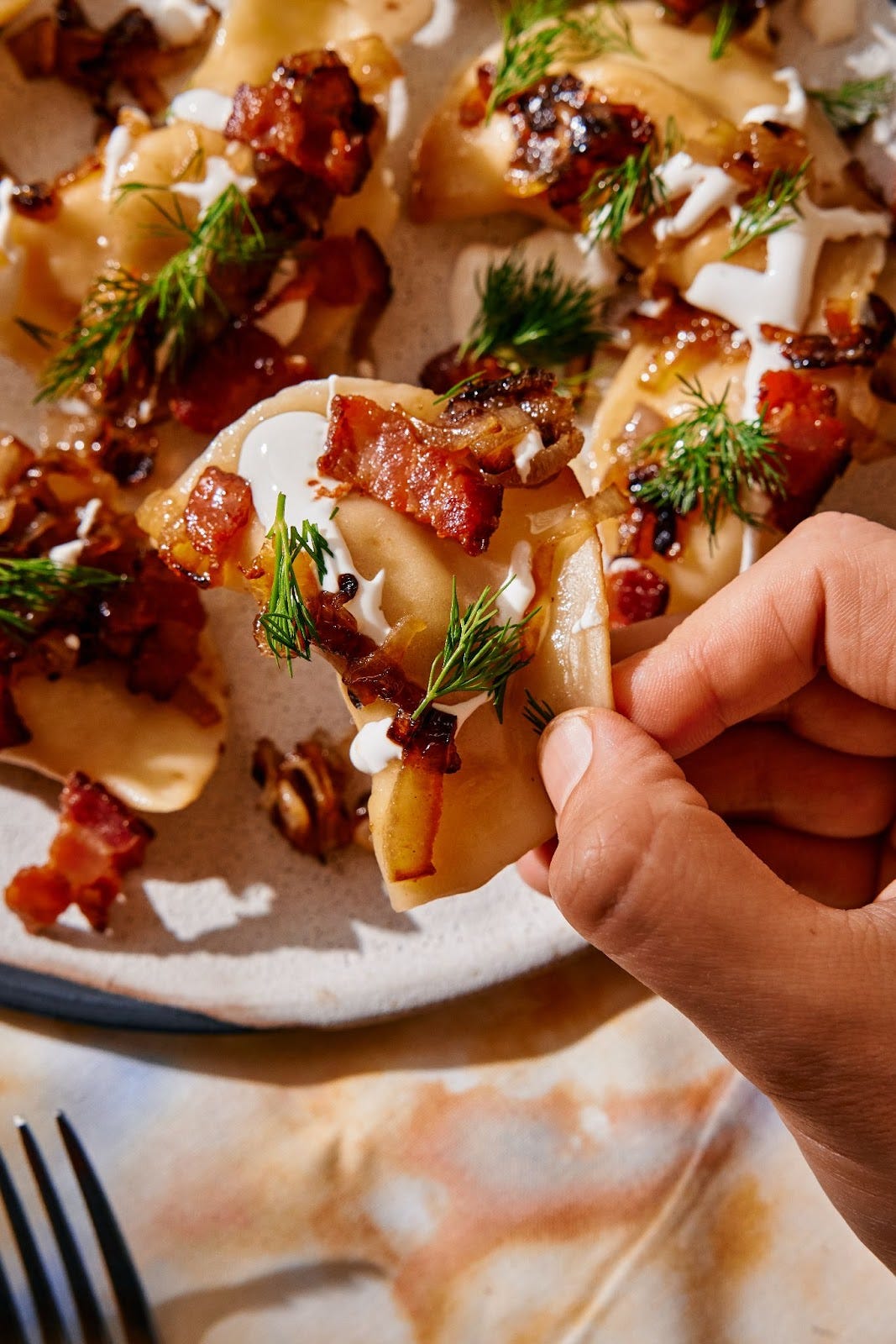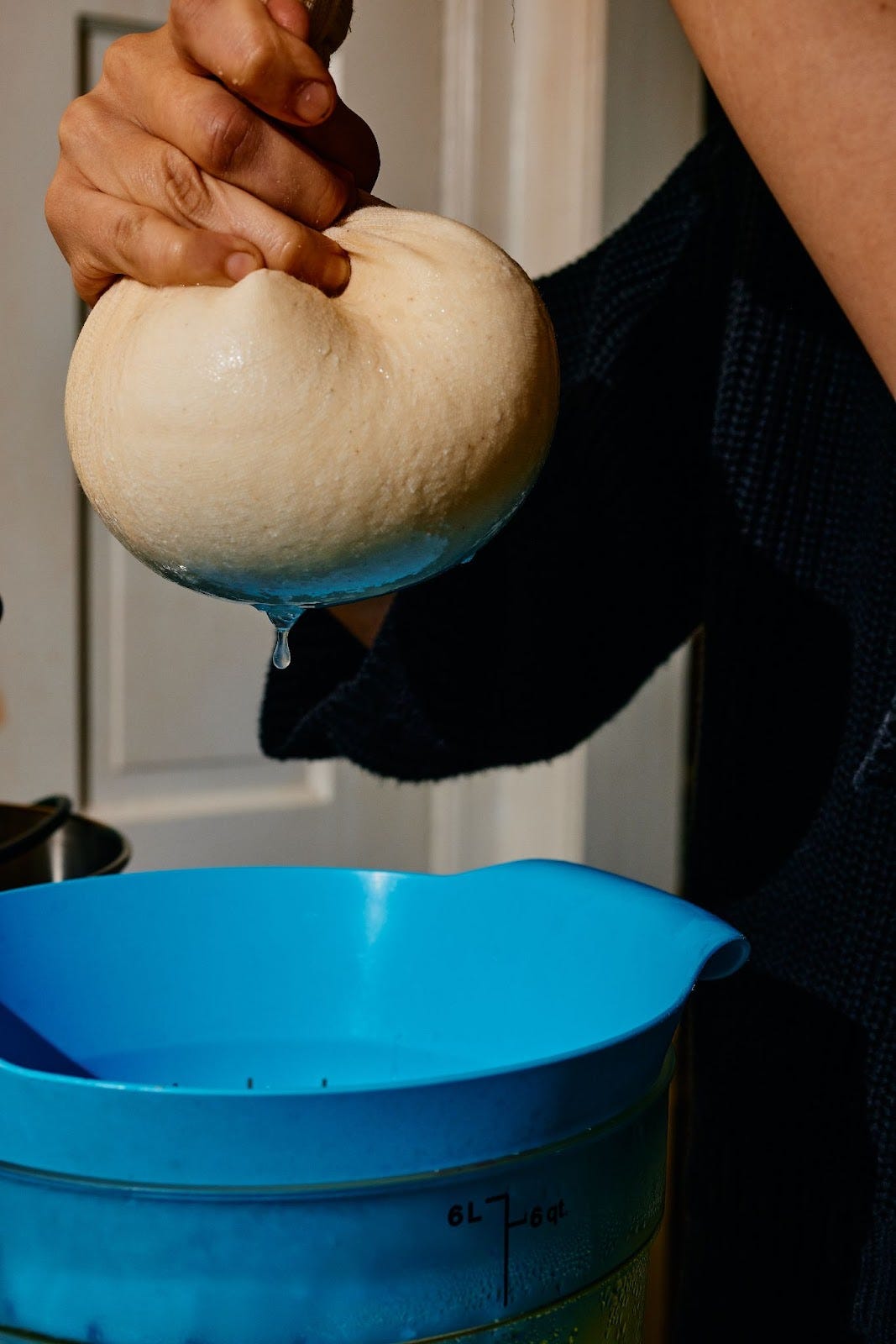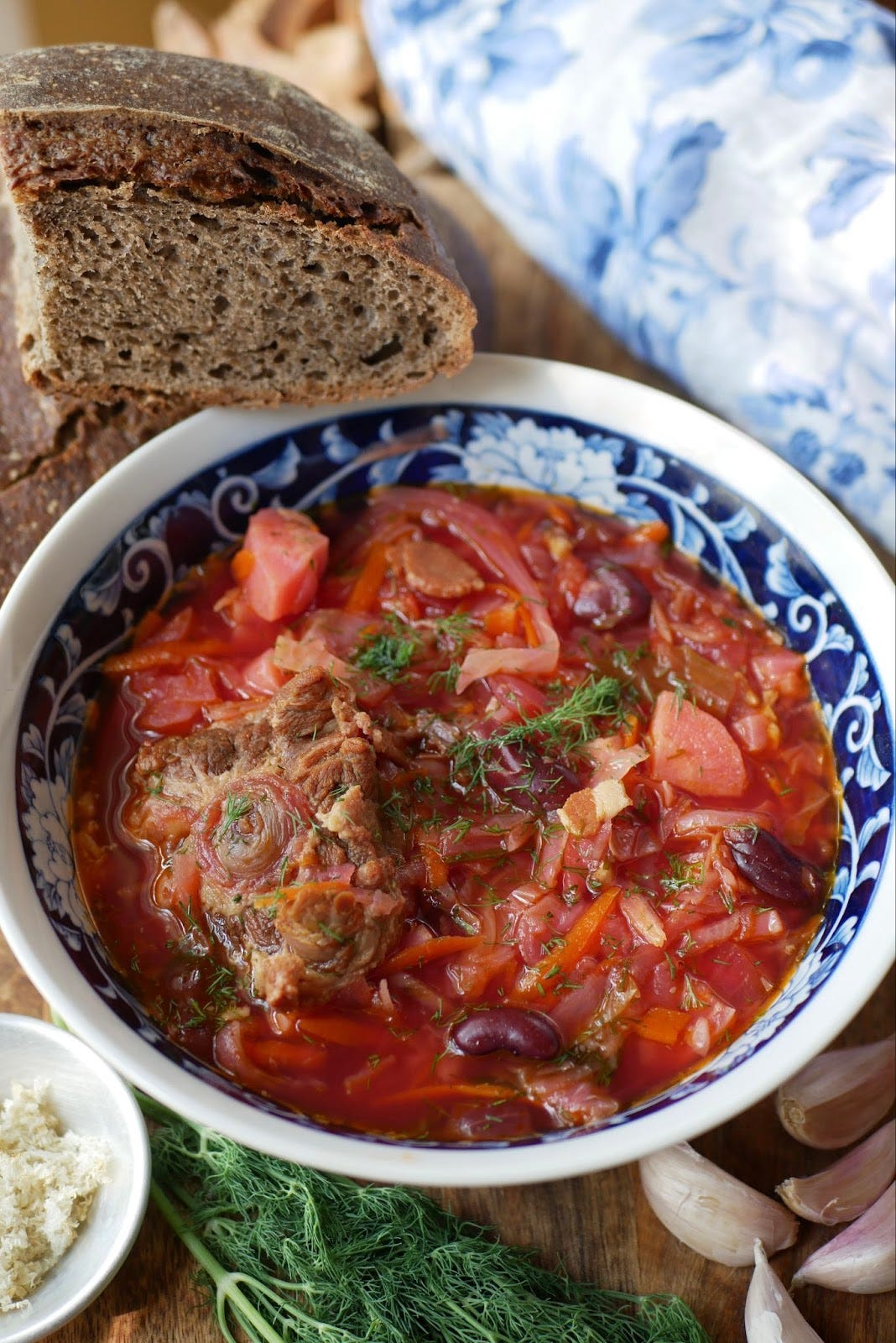A Case for More Ukrainian Cookbooks in the English Language Publishing World
Am I Ukrainian Enough to Write a Ukrainian Cookbook?
Today, I want to talk about my struggles and feelings of not being Ukrainian enough in a cookbook publishing world that is looking for authentic and native Ukrainian voices to publish.
In an attempt to stay honesty and transparent, I am sharing the Marketing and Promotion section of my unsold cookbook proposal in today’s newsletter. I hope this example of a marketing section that did not work effectively can help someone who is currently working on their own marketing section of their cookbook proposal.
Before we dive into the proposal let’s talk a little about traditional publishing.
Publishing is Not in the Business of Investing in Authors
It’s strange to think about being one viral TikTok or Reel away from publishing a cookbook. Social media is often talked about as the great equalizer. It gives those who could never have access to traditional creative spaces such as publishing, fashion, music industry, film industry, art world, etc. an opportunity to make it big. TikTok, especially, is hailed as the platform where normal people can make their dreams come true, there’s less emphasis on curation and more on being “real”. At least that’s what these platforms want us to believe. Creators, authors, film makers continue to make endless content in the hope of making it big. It’s similar to playing the lottery. You keep investing your time, money, energy into your Instagram or TikTok page hoping to get noticed.
Is social media actually helping democratize access to creative spaces? This same rhetoric was used during the early ages of blogging in the mid to late 2000’s. You might not be paying with money and social capital for your path towards becoming a full-time creative but you are still paying with your most important commodity, and that is your time. Creatives are spending their time creating, managing, and posting content on platforms. We are active participants in the attention economy upon which social media platforms are built. Their sole purpose is to keep people on their app. What if those hours making content was actually going towards your craft be it painting, writing, baking, etc? What if we took self-promotion and building a brand out of the equation? What if we just want to make, write, and share stuff.

Publishing has come to embrace social media with open arms. They rely on authors, influences, creators, to promote and sell their books on social media platforms especially TikTok that holds the power of #BookTok. Publishing presses look to social media for trends, new authors, and marketing. They look at what’s currently trending and what could bring in revenue. But what about the other way? Why aren’t publishing houses playing a bigger role in creating and setting the trends themselves? Why don’t they publish books that can impact and change the current social appetites? Why are publishers relying or displacing that responsibility onto social media?
In an age of direct marketing, publishers are shrinking their marketing departments instead of investing in them. That feels very backwards to me. It’s the consumer that creates demand. Publishers can harness enormous power from direct marketing similar to other industries such as tech, e-commerce, finance, higher education even. Why don’t we see more sales teams in publishing presses? College publishing, for example, relies heavily on sales representatives who travel from campus to campus trying to offer textbooks that align and meet the needs of faculty and their curriculum. Why isn’t the trade side doing that? I don’t know enough about distribution on the trade side but I don’t initially see the difference between selling textbooks and selling trade books. Do you?
Am I Ukrainian Enough to Write a Ukrainian Cookbook?
Okay, now onto the hard part. I am going to say the quite parts out loud. I have been thinking a lot about the “real” reason why my proposal for a Ukrainian cookbook was turned out and I think the real reason is because I wasn’t Ukrainian enough and nor was my proposal. My proposal was offering a more nuanced look at Ukrainian cuisine with a focus on marginalized ethnic communities whose cuisine and culinary traditions are being actively erased and forgotten due to the devastating war in Ukraine. I was offering a more complicated and nuanced definition of national Ukrainian cuisine, the proposed title of my cookbook was, Preserving and Celebrating the Diversity of Ukrainian Cuisine.
At the same time as I was trying to sell my proposal in 2022, other Ukrainian authors did manage to secure book deals with US and UK based publishers. A cookbook proposal by Yevhen Klopotenko was sold to Voracious Books that year. His cookbook “The Authentic Ukrainian Kitchen” actually just came out about a month. It has a very interesting and telling subtitle “Recipes from a Native Chef”. First of all, let me just say, that I am not comparing myself to Yevhen who literally has a culinary empire over in Ukraine and his selling power is on a completely different stratosphere, he is a in essence a celebrity chef of Ukraine who has done incredible global scale work of promoting and preserving Ukrainian culinary culture.
But I do find it interesting that the title and the subtitle of the book, have the words authentic and native in them. As someone who moved here as a little kid, I could never claim the same type of authenticity, authority, or closeness of Ukrainian cuisine as someone who lives, cooks, manages restaurants in Ukraine. Or could I? As an immigrant kid, the authenticity of my identity has always been under question. This left me constantly feeling that I was never enough of any one thing. Not American enough, not Ukrainians enough, not Greek enough, not Greek-Ukrainian enough. Do I think being an immigrant kid would have prevented me from writing a thoroughly researched cookbook? Absolutely not. I’m a trained cultural historian with experience in doing oral history, ethnography, and managing and preserving cultural material history. Do I think the American public is ready for a more nuanced definition of Ukrainian national cuisine? Absolutely! Was the publishing world ready for it? Well, I think we have our answer.
I want to draw special attention to recipes of ethnic minority groups of Ukraine, such as Crimean Tatars, Greek-Ukrainians, Roma, Urums, Korean-Ukrainians, Hutsuls, that make up the multicultural and multiethnic nation that is Ukraine.
Lastly, my cookbook was going to tackle the very sensitive topics of colonialism and imperialism. Believe it or not but these topics don’t usually sell a lot of cookbooks. Unpacking the hundreds of years of imperialism and colonialism that Ukraine has experienced and the ways in which they have impacted the culinary culture of Ukraine both as a nation and an ethnic group was leaning a lot more into formal scholarship than cookbook territory. Do I think if I was a faculty member at a research university I could have made this book with a university press? Absolutely. And that’s my point. You need to be very aware of where your proposal fits and where it doesn’t. Mine fell in the middle which I think lead to editors feeling unsure if this is a cookbook they could sell in the trade market. Would I have been able to sell this book/cookbook to libraries, universities, and high schools? Absolutely.
There is no denying that there is a massive gap in Ukrainian cuisine scholarship and cookbook space. There is no book that currently exists that openly acknowledges and discusses the impact of colonialism and imperialism on Ukrainian national and ethnic cuisine while emphasizing the marginalized ethnic communities of Ukraine and the incredibly important role that they played and continue to play in the formation of Ukrainian national cuisine and culinary identity.
The most ironic part is that these conversations are happening all over Ukraine nowadays by Ukrainian food scholars, food writers, chefs, and other food experts. My goal was to bring the two worlds together. To bridge the gap between the culinary discourse of Ukrainian cuisine in Ukraine to the culinary discourse of Ukrainian cuisine in the U.S. I will continue to work on this goal in my own research and I’m excited to start sharing what some of that work looks like on my Substack very soon.
Goal
Having said all that. The main goal of today’s newsletter is to share the marketing and promotion section from my unsold cookbook proposal. Rereading this, I can already tell you all the things that are wrong with it. You can also see my comp list at the end. Quick note, the gorgeous photographs from Mackenzie Smith Kelly were included in the second round of trying to sell the proposal. What that means in publishing is that, your proposal is initially sent to let’s say 15 publishers. If none of those buy the proposal, you go to the next list of let’s say another 14 editors. I think on average there are two or three rounds instead of sending the proposal to all 30 or so editors all at once.
In full transparency, I wrote this marketing and promotion section under the impression that the publishing house would be selling my book instead of telling them exactly how I will sell it. If we were operating in a world where publishing houses were in the business of investing in their authors and setting trends, this proposal could have done better. But instead we primarily operate in a world where the majority of publishing presses are in the business of helping brands and established creatives monetize their brands and in return gain monetary revenue of whatever that already sells.
Marketing and Promotion
The US and Canadian markets are in serious need of a hardcover Ukrainian specific cookbook that delves into the cultural, political, and historical landscape of this beautiful country. I would be the first American author to produce a photography heavy cookbook that focuses on the diversity, complexity, and regionality of Ukrainian cuisine and identity, published by a major press.
Additionally, there is no cookbook on the market that documents the culinary role of ethnic minority groups of Ukraine. My cookbook will fill this gap in the market and bring a more nuanced vision of Ukrainian national cuisine out into the world. While simultaneously preserving the culinary traditions of some of Ukraine’s most marginalized communities. This cookbook will introduce English speaking readers to both traditional Ukrainian recipes and the multicultural and multiethnic nature of Ukrainian cuisine, an aspect of Ukrainian food that hasn’t been highlighted in previous publications.
I’ve amassed a large network of support made up of food writers, podcasters, photographers, national brands, restaurant owners, influencers, and fellow cookbook authors. I have spoken to many of them about the project and they are thrilled to support me and my cookbook. This support includes sharing pre-order links, hosting events, featuring recipes from the book on their platforms, conducting interviews, and reviews. I have 18K loyal and highly engaged followers on Instagram and 1,100 subscribers on my Substack newsletter, LocalBreadBaker.com. I have a great relationship with Austin food editors Chris Hughes from Austin Monthly and Matthew Odam from Austin360. I also bring tons of food industry connections in cities such as Austin, Texas; New York City; Seattle, Los Angeles; Toronto; Pittsburgh and Cleveland, Ohio; and Barcelona, Spain.
My chef friends in Austin have offered to help me sell my books at their restaurants and have suggested promotions such as special dishes or hosting a pop-up. I also have strong relationships with Ukrainian nonprofits such as Liberty Ukraine and Ukrainian communities all over the U.S. and Canada.

Who is going to buy it?
There is a surge of interest in Ukrainian cuisine and recipes in the USA. There are many new Eastern European restaurants and pop ups that are opening across the U.S. People my age and younger are rediscovering and celebrating their Slavic and Ukrainian heritage. The recent media and food media coverage of Ukraine is contributing to this growth. I have published Ukrainian recipes in the New York Times, Food52, Serious Eats, and Bake from Scratch. Additionally, the success of Olia Hercules’ two Ukrainian cookbooks, Mamushka (2014) and Summer Kitchens (2020) further supports the public's interest in Ukrainian food. My plan is to have the draft of the manuscript completed by January 2024. This will include all of the recipes, sidebars, and essays.
Recipes will be accompanied by beautiful food photos and archival family photos which will help bring to life my stories and memories of Ukraine and Ukrainian food for the readers. Photographs are very important to me; my grandfather was a photographer. I intend to work with Mackenzie Smith Kelly, Jess Attie, or Larisa Niedle, a Ukrainian food photographer who shot my recipe for Serious Eats. Mackenzie and Jess are based in Austin, Texas. The food stylist for the cookbook will be Victoria Granof. Victoria is Ukrainian and has already expressed immense excitement for the project. For the photography I imagine bright colors, primarily bold natural colors, blue and yellow, cherry red, green like fresh herbs and leaves, bright like a cool morning, bright white sunny midday light juxtaposed against neutral and even empty backgrounds. Dishware and cookery reminiscent of Ukrainian style. Memories of table settings and the garden. I envision many close ups of dishes, well lit with bright daylight isolating the dish from a neutral uncluttered background reminiscent of a Carvaggio painting. The idea is to focus on the dish entirely, all of its colors and textures, and letting it set a mood without the help of a place setting.

Every week I receive emails and messages from people who want to help Ukraine. Purchasing this cookbook will not solely attract cookbook readers but also people who want to participate in advocacy. Buying this book will be an act of resistance. The purchase of each book contributes to the preservation of Ukrainian cuisine. I plan on partnering with Ukrainian communities and nonprofits all over the U.S. during the promotion of the book. I already have strong ties with Ukrainian communities in Texas, New York, Ohio, Pennsylvania, California, and Canada. Greek-Americans will be interested in the book as well.
Eastern European and Central Asian cuisine is gaining unprecedented attention and popularity. Single subject cookbooks on topics such as Eastern European baking are being published reflecting the public’s desire for more specialized Eastern European cookbooks. This past year, a Romanian baking book by Irina Georgesu, won a James Beard Award. My book will be full of baking recipes as Ukraine has one of the richest baking traditions in the world.
My Comp List:
Note* This section of my proposal was written in fall of 2022.
Budmo!: Recipes from A Ukrainian Kitchen, by Anna Voloshyna [Hardcover, 224pp, Rizzoli, 2022]
Summer Kitchens: Recipes and Reminiscences from Every Corner of Ukraine, by Olia Hercules [Hardcover, 351 pp, Weldon Owen, 2020]
Mamushka: Recipes from Ukraine & Beyond, by Olia Hercules [Hardcover, 240 pp, London Mitchell Beazley, a division of Octopus Publishing Group Ltd, 2015]
Black Sea: Dispatches and Recipes, Through Darkness and Light, by Caroline Eden, Ola O. Smit, and Theodore Kaye [Hardcover, 279pp, Quadrille, an imprint of Hardie Grant, 2018]
TAVA: eastern european baking and desserts from romania & beyond, by Irina Georgescu [Hardcover, 272pp, Hardie Grant, 2022]
Lavash: The Bread That Launched 1,000 Meals, and Other Recipes from Armenia by Kate Leahy, Ara Zada, and John Lee [Hardcover, 248pp, La Vergne: Chronicle Books LLC, 2019]
Kaukasis: A Culinary Journey through Georgia, Azerbaijan & Beyond, by Olia Hercules [Hardcover, 240pp, Weldon Owen, 2017]
Tasting Georgia: A Food and Wine Journey in the Caucasus with Over 70 Recipes by Carla Capalbo [Hardcover, 464pp, Interlink Books, 2016]
Amber & Rye: A Baltic Food Journey: Estonia • Latvia • Lithuania by Zuza Zak [Hardcover, 256pp, Interlink Books, 2021]
The New Ukrainian Cookbook: a blend of tradition and innovation, by Annette Ogrodnik Corona [Hardcover, 270pp, Hippocrene Books INC. 2012]



Another way to look at your book would be that yours is a unique American story. Believe me, those of us with third and fourth generation nationalities feel more displaced than you can imagine. We may be American but we also have ancestors that we never really knew except a grandparent or a culture that we never experienced. You have the best of both worlds. It is what the American story is truly all about so just keep telling it.
There is a time for everything as long as there is faith behind it and hope. You have that in your book. Are you Ukrainian enough? You were born and raised there and you are first generation newly US citizenship to the US so why would you feel you are anything less. Claim your identity and hold on to it. We are going into third and fourth generation of our nationalities in the US. You have not truly been assimilated as you have held on to where you were born and your traditions. The way you are putting your story together is unique for you and it's important. Persevere.